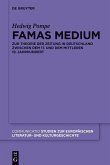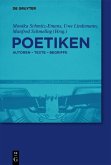In the first section the study reconstructs the reception of Aristotle's Treatise on Poetry and the genesis of the concept of fiction. In the second part it reconstructs the history of the concept of inspiration, which around 1500 was still understood to be divine expression, but which in the course of the 16th and 17th century was reinterpreted to mean the specific talent of the poet. At the beginning of the 18th century this later evolved into the concept of genius. While fictionality became the defining feature of the novel, the specific inspired writing style became the main characteristic of poetry.
Dieser Download kann aus rechtlichen Gründen nur mit Rechnungsadresse in A, B, BG, CY, CZ, D, DK, EW, E, FIN, F, GR, HR, H, IRL, I, LT, L, LR, M, NL, PL, P, R, S, SLO, SK ausgeliefert werden.
"Eine überaus dichte, ideen- und begriffsgeschichtliche Darstellung zum Dichtungsbegriff in der Frühen Neuzeit, die sehr weit gefasst wird: die ma. Averroes-Rezeption bildet den Anfang, mit Herder und Klopstock endet die Darstellung."
Schubert in: Archiv für Reformationsgeschichte - Literaturbericht, Jahrgang 40/2011
Schubert in: Archiv für Reformationsgeschichte - Literaturbericht, Jahrgang 40/2011









